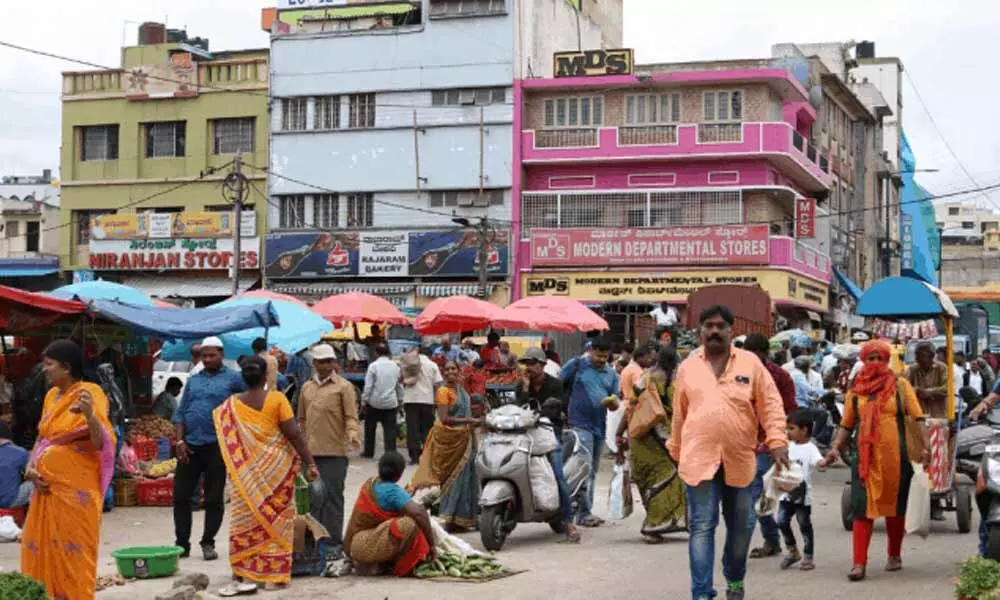Street vendors, sex workers reeling under COVID-19 impact, says APU study

Street vendors, sex workers reeling under COVID-19 impact, says APU study
In a study titled ‘Impact of COVID-19 on livelihoods of informal sector workers and vulnerable groups in Bengaluru: A view from the ground’, conducted by Azim Premji University (APU), it is revealed that the informal sector workers, lacking the safety-net formal sector employment provides, have been adversely affected by the impacts of the pandemic
Bengaluru: In a study titled 'Impact of COVID-19 on livelihoods of informal sector workers and vulnerable groups in Bengaluru: A view from the ground', conducted by Azim Premji University (APU), it is revealed that the informal sector workers, lacking the safety-net formal sector employment provides, have been adversely affected by the impacts of the pandemic.
Prolonged livelihood loss and a slow revival of trade have continued to stress the lives and livelihoods of these vulnerable groups. Managing essential household expenses, mortgage, access to healthcare, and diminished employment opportunities are some of the major challenges faced by such families. This study, undertaken in December 2020 reveals the nature of the pandemic's impact upon informal sector workers across the city of Bengaluru.
The study finds that the current status of livelihoods of many informal sector workers, whether self-employed in nature (street vendors, waste-pickers, auto drivers, mechanics, dhobis, small business) or working on wages rather than fixed salaries (domestic workers, sex workers, construction workers, piece rate workers) and vulnerable groups (garment workers, security staff, retail shop workers) endured severe disruptions and has not revived to levels before the spread of the pandemic.
The study also finds that while 15 percent informal sector workers are still unemployed after losing their previous jobs, in addition 23 percent had experienced a break in employment during the pandemic, and, about 46 percent are currently engaged in the same job but with less pay.
Informal sector workers, especially the vulnerable and disadvantaged such as women and elderly workers, have experienced difficulty in sustaining existing livelihoods as well as in finding jobs. Over 10 civil society organisations, subject-matter experts and members of the Azim Premji Foundation, conducted this study through a combination of personal interviews, secondary data, and surveys, comparing the situation of the informal sector workers and vulnerable groups of the city now to that existed before the lockdown in March 2020.
The report emphasizes that informal sector workers and vulnerable groups have highly precarious livelihoods. These challenges need to be tackled on multiple fronts, including creation of better-quality livelihood opportunities, adequate social security, and public services. This requires a synergy and collaboration between business, civil society and government, mere economic growth is insufficient to address these fundamental structural issues.
The study quotes Vinay Sreenivasa from Alternative Law Forum and Jancy from Action Aid who shared vital inputs on the status of street vendors.
"The first two months of the lockdown were the harshest for street vendors as they had no work. A report in the initial days of the lockdown pointed out that street vendors suffered tremendously as authorities had banned them. As per reports, more than 20 percent vendors from other districts of Karnataka have not yet come back from their hometowns. Some vendors have stayed away from Bengaluru for as long as six to seven months," the study says.
Based on inputs from Tejaswini, Karnataka Sex Workers Union and Kallana Gowda, Swasthi, the situation is dire for sex workers in most parts of Bengaluru. The industry, vulnerable at the best of times has not yet recovered from the initial onslaught of effects of the pandemic. Several brothels across the city have closed or are working at reduced capacity. Also, incomes have nosedived by as much as 40 percent compared to the pre-pandemic times.
"Bengaluru North has seen a 50 percent fall in business as compared to before the pandemic. There has been an increase in police raids as well. Day business has crashed and whatever work is available is being conducted in late nights, usually after 10 p.m. There is an increase in rowdy clients who often renege on payment and are also involved in the extortion of money from vulnerable sex workers," the study elaborates.
Key findings of the survey are
♦ A majority of the working population is between the ages of 30-42 years. Workers from all ages have experienced reduced incomes and the mean age of 34 suggests that most younger workers have faced job losses or reduced income or both
♦ Migrants constitute around 38 percent of the respondents. While some respondents were migrants from other states, intra-state workers also constituted a significant portion of the respondents. Survey reports that Andhra Pradesh, Karnataka and Assam account for a large percentage of migrants. Tamil Nadu and Orissa also contribute a high number of migrants. Additionally, a majority of workers (around 54 percent) call Bengaluru their home as they have been residents for two or more generations. Continuing job losses have been recorded for workers from all geographies of the city.




